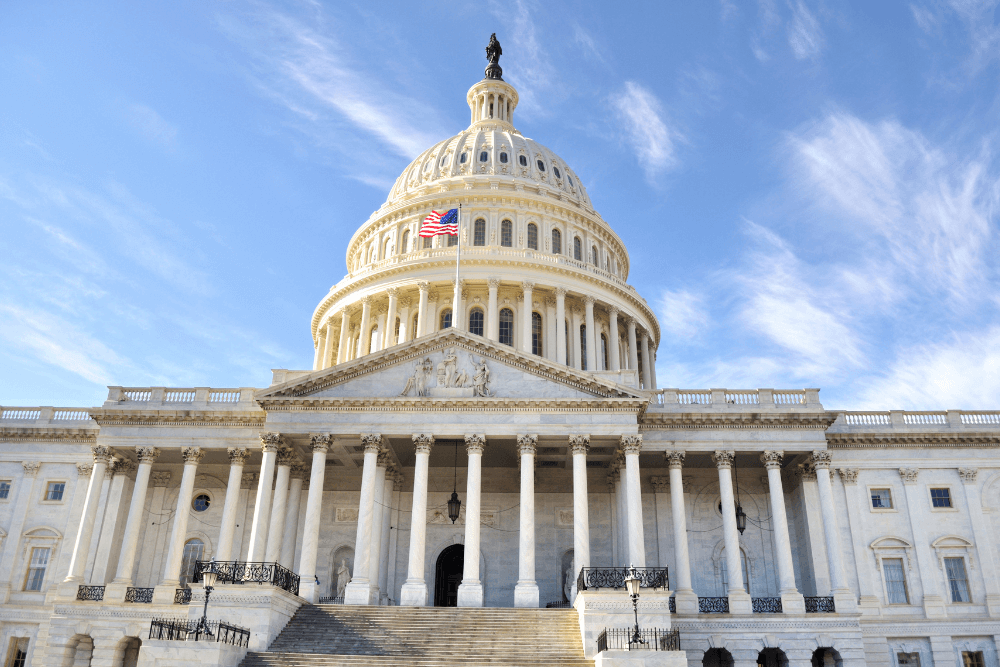A month into 2024, Congress is (still) grappling with a number of urgent, must-pass bills related to issues like border security, aid for Ukraine and Israel, and the federal budget. At a time when the government seems more dysfunctional than ever, it’s important to remember that this chaos results in cannabis issues (and unfortunately, many others) having difficulty in gaining traction in Congress. As a result, cannabis legislation and priorities have been slow moving so far this year- but I feel confident that there’s light at the end of the tunnel!
SAFE Banking
To recap: the ever-elusive SAFE Banking Act was reintroduced in 2023 by Senators Jeff Merkley (D-OR) and Steve Daines (R-MT) alongside Representatives Earl Blumenauer (D-OR) and Dave Joyce (R-OH). Soon after, the Senate Committee on Banking, Housing, and Urban Affairs held a hearing titled “Examining Cannabis Banking Challenges of Small Businesses and Workers” discussing both the bill and the topic of cannabis banking broadly.
As the momentum for SAFE Banking increased, so did some Senators’ concerns– primarily surrounding a provision that would bar federal banking regulators from taking discriminatory enforcement action against any industry.
As a result, an updated version of the bill called the SAFER (Secure and Fair Enforcement Regulation) Banking Act was introduced, marked up by the Committee, and passed out of Committee by a vote of 16-14 in late September 2023.
That brings us to 2024. Although SAFER has not been scheduled for a floor vote yet, NCIA is cautiously optimistic on its chances this year — whether that be as a standalone bill or attached to another larger financial services related package. That being said, the bill will undoubtedly face an uphill battle no matter how it arrives at the GOP-controlled House of Representatives.
Other Congressional News
Outside of SAFE(R) Banking, there has been some additional congressional cannabis news in 2024 including a Senate letter urging descheduling, a bicameral letter regarding Chinese-related illicit grow operations, and a new Congressional Research Service (CRS) report on the impact of moving cannabis from Schedule I to III in the federal Controlled Substances Act.
In late January, Senators Elizabeth Warren (D-MA) and John Fetterman (D-PA), led nine of their Democratic colleagues (including Senate Majority Leader Chuck Schumer [D-NY]), in sending a letter to Attorney General Merrick Garland and Drug Enforcement (DEA) Administrator Anne Milgram. The letter urged Milgram and Garland to remove marijuana from Schedule I of the Controlled Substances Act entirely, commonly known as descheduling.
Then, just days ago, Senators Joni Ernst (R-IA) and Angus King (I-ME) alongside Congressmen Pete Sessions (R-TX), Jared Golden (D-ME), and David Valadao (R-CA) led 48 of their colleagues in calling on Attorney General Merrick Garland to prevent any national security risk and end any illicit human trafficking connected to Chinese-linked marijuana farms in the United States.
In the bipartisan, bicameral letter, the lawmakers pointed out that Chinese nationals (some with potential ties to the Chinese Communist Party), are operating marijuana farms across the country and even potentially engaging in human and drug trafficking in conjunction with these operations. The lawmakers asked the Department of Justice for a briefing on the topic by the end of the month and posed several specific questions for the agency.
In mid-January, the Congressional Research Service (CRS) released a new report titled “Legal Consequences of Rescheduling Marijuana” that primarily focused on “Legal Consequences If Marijuana Moved to Schedule III” and considerations for Congress. CRS works for members of Congress and their committees and staff on a confidential, nonpartisan basis and is highly regarded here in Washington, D.C.
Biden Administration
In 2022, the Biden Administration announced that it would ask the Secretary of Health and Human Services (HHS) and the Attorney General to initiate the administrative process to review how marijuana is scheduled under federal law.
As a result, in August 2023, news broke that the Department of Health and Human Services (HHS) recommended to the Drug Enforcement Administration (DEA) that cannabis be rescheduled and placed in Schedule III, meaning that it has moderate to low abuse potential, a currently accepted medical use, and a low potential for psychological dependence. Since then, the DEA has been conducting their review of where marijuana should be placed in the Controlled Substances Act, which will then be followed by a public comment period.
To be clear, NCIA supports ending the criminalization of our industry by removing cannabis (including THC) from the federal Controlled Substances Act altogether so that our businesses are treated like all other lawful American businesses. That being said, it’s likely that the DEA will follow the HHS recommendations and choose to place marijuana in Schedule III.
While NCIA continues to draft our response to the inevitable announcement — whatever it may be — we also want to hear from our members about their views on this critical issue. If you are a member of NCIA, check your inbox for a link to our online survey in order to make your voice heard. If your business isn’t yet a member but you want to get off the sidelines of the cannabis reform movement, join today!
NCIA is proudly the only organization focused on representing independent businesses in our nation’s capital and the work we do moving policy reforms forward is only possible because of the hundreds of businesses that make up our membership.
It goes without saying that 2024 is shaping up to be a big one for federal cannabis policy reform. Stay connected and engaged by attending one of our upcoming Stakeholder Summits where you can engage and learn from state officials, federal policymakers, and even me!
If you really want to play a bigger role in advancing cannabis policy reform, we hope you’ll also join us in Washington, D.C. for our 12th Annual Cannabis Industry Lobby Days this May. See you there!



Follow NCIA
Newsletter
Facebook
Twitter
LinkedIn
Instagram
–